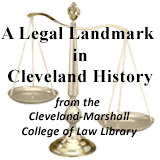Mapp v. Ohio - 367 U.S. 643 (1961)
Court of Common Pleas (Case No. 68,326)
Prior to Mapp's criminal trial, Attorney Kearns submitted a Motion to Suppress seeking to exclude the obscene materials that the police had confiscated from Mapp's house. He argued that the police illegally obtained these materials because they did not have a valid warrant. Attorney Kearns based his argument on article IV, section 2 of the Ohio Constitution and section 2933.24 of the Ohio Revised Code. OHIO REV. CODE § 2933.24 (1953). He argued that under Ohio law, it could be reasonably inferred that the State of Ohio meant to adopt the exclusionary rule.
The Supreme Court of the United States established the "exclusionary rule" in Weeks v. United States, 232 U. S. 383 (1914) under which the Court held that evidence obtained through violation of the defendant's constitutional rights (i.e., evidence obtained without a warrant, as required by the Fourth Amendment) was inadmissible in the criminal trial. Under Ohio law, the exclusionary rule was not adopted for Ohio state court proceedings, following State v. Lindway, 131 Ohio St. 166 (1936). The holding of Lindway was consistent with the Supreme Court of the United States' decision in Wolf v. Colorado, 338 U.S. 25 (1949), which held that the exclusionary rule applied only to trials which reached the federal court system. The Wolf Court also held that each state could choose whether to enforce this rule in that state's courts. While Attorney Kearns failed to cite Wolf v. Colorado in his motion, the trial court nevertheless ruled against Mapp based solely on Lindway. Consequently, the court denied the motion and the obscene material was admitted into evidence during Mapp's criminal trial.
On September 3, 1958, Judge Donald F. Lybarger presided over the criminal trial. Assistant Prosecuting Attorney for Cuyahoga County, Gertrude Bauer Mahon, represented the State of Ohio. She called the following witnesses: Sergeant Carl Delau and Officer Michael Haney. A. L. Kearns was Mapp's attorney. He called the following witnesses: Walter L. Greene, an associate with Kearns' firm; Dolores Clark, a friend of Mapp; and Dollree Mapp, the defendant.
During the trial, Attorney Kearns cross-examined of Officer Haney regarding whether a warrant existed:
- Question by Attorney Kearns (Q): Where is that search warrant?
- Answer by Officer Haney (A): I don't know.
- Q: Do you have it here?
- A: I don't have it.
- Q: Would you tell the jury who has it?
- A: I can't tell the jury who has it; no, sir.
- Q: And you were one of the investigating officers in the investigation by the police department?
- A: Yes.
- Q: But you can't tell us where the search warrant is?
- A: No, I cannot.
- Q: Or what it recites?
- A: No.
- Q: You yourself did not obtain the search warrant, did you, officer?
- A: No, I did not.
- Q: Do you know who did?
- A: I was told Lieutenant White obtained it.
Transcript of Record at 16, State v. Mapp, (1958) (No. 68326)
The trial lasted merely one day. On September 4, 1958, the jury found Mapp guilty of possession of obscene literature, charging her with a sentence of up to seven years in the Ohio Reformatory for Women. The Cuyahoga County Court of Common Pleas denied Mapp's request for a new trial.




